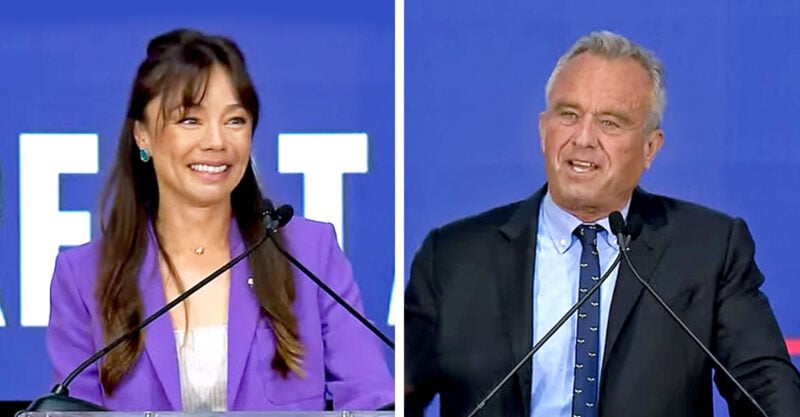Miss a day, miss a lot. Subscribe to The Defender's Top News of the Day. It's free.
Robert F. Kennedy Jr. on Tuesday tapped Nicole Shanahan, a lawyer, entrepreneur and philanthropist, to be his vice presidential running mate.
Kennedy, Children’s Health Defense (CHD) founder and chairman on leave, is running for president of the U.S. as an independent.
In making the announcement, Kennedy said, “I wanted a VP who cares about healing our children, protecting our environment, restoring our soils, and getting the chemicals out of our food.”
Speaking at a rally in her hometown of Oakland, California, Shanahan emphasized her commitment to addressing the chronic disease epidemic plaguing the U.S., drawing from her personal experiences and expertise in technology and health.
“We can solve the mysteries guarded by corporate influence,” Shanahan declared. “We can move from band-aid solutions and we can end this chronic disease epidemic once and for all.”
Shanahan’s passion for addressing the chronic disease epidemic stems from her personal experience. In November 2018, she gave birth to a healthy baby girl, but by 10 months of age, her daughter’s health had deteriorated dramatically.
“She wasn’t speaking, she wasn’t pointing, she seemed kind of in her own world,” Shanahan revealed in an introductory video. After receiving the diagnosis of autism, “My life changed forever,” she said.
Through her journey, Shanahan discovered that women’s fertility is in precipitous decline around the world. She said she came to understand the crisis in reproductive health is embedded in the larger epidemic of chronic disease.
“Because it has been so personal for me and my daughter, I got deep into the research and consulted some of the best scientists and doctors,” Shanahan explained.
Three main causes of chronic disease epidemic
Shanahan said her research led her to identify three main causes of the chronic disease epidemic.
The first is toxic substances in the environment, such as endocrine-disrupting chemicals — including pesticide residues, industrial pollutants, microplastics and PFAS forever chemicals — in food, water and soil “that have contaminated nearly every human cell,” she said.
Shanahan also raised the issue of electromagnetic pollution. “You don’t hear politicians talking much about that either, but it is something we need to look at,” she said.
Medications, according to Shanahan, are also to blame. While pharmaceutical medicine has its place, she said no single safety study has assessed the “cumulative impact of one prescription on top of another prescription and one shot on top of another shot on top of another shot throughout the course of childhood.”
“We just don’t do that study right now, and we ought to,” she said. “We can and we will.”
‘We just have to ask the right questions’
While Kennedy works on ending the corporate capture of regulatory agencies, Shanahan vowed to assemble the best technologists and scientists in the world to address chronic disease.
“We will use the latest in AI [artificial intelligence] and computation [to] examine the health records databases of our nation and those other nations who are also on a quest to solve chronic disease,” she said.
Using that process, it should take “weeks, not decades” to find the answers to “our most pressing health concerns,” she said.
Shanahan emphasized the importance of moving out of the dark ages of medicine. “It is time to rid science of the corporate bias that contaminates it today,” she said.
She said she’s confident American parents “already know the truth of the matter” and that it is long overdue for the government to fulfill its “duty of care” to American families.
Drawing on her background in technology, Shanahan said she thinks in terms of data. “The CDC [Centers for Disease Control and Prevention] and research institutions have the data we need … [to] figure out what’s making us sick.”
“We can apply technology to figure out environmental factors,” she said. “We just have to ask the right questions, do the right research and apply the right tools.”
‘These moms, they’re my heroes’
Shanahan’s vision for addressing the chronic disease epidemic involves a shift in the priorities of medicine, away from the focus on “a new pill or ‘finding the cure’” toward “compassion” and “cleaning up our environment and providing the basic public goods that are the foundational conditions for health and healing.”
“Chronic disease, addiction, poverty, depression — this is where Americans are hurting the most,” she said.
Underscoring her deeply personal commitment to this cause, Shanahan revealed that most of the philanthropists she works with are also mothers who “watch in anguish, many of them, when their children suffer from chronic disease” and who “cry silently as their teenagers deal with depression, anxiety and addiction.”
“These moms, they’re my heroes,” she said. “They’re the moms trying to make a normal life for their children in a world that has gone crazy.”
Shanahan said that it was initially a mother in the audience who reached out to inspire her support for Kennedy’s campaign.
She concluded her speech with a powerful message of hope and healing:
“As a mother myself who knows the firsthand challenges of raising a child with special needs, I promise to you to make this world a little less crazy. …
“And this won’t happen overnight. But I have seen miracles that the human spirit can accomplish. I have seen its resilience. And most importantly, I have seen its capacity to heal. And what is possible for the human being is also possible for our nation.”
The Defender on occasion posts content related to Children’s Health Defense’s nonprofit mission that features Mr. Kennedy’s views on the issues CHD and The Defender regularly cover. In keeping with Federal Election Commission rules, this content does not represent an endorsement of Mr. Kennedy, who is on leave from CHD and is running as an independent for president of the U.S.









